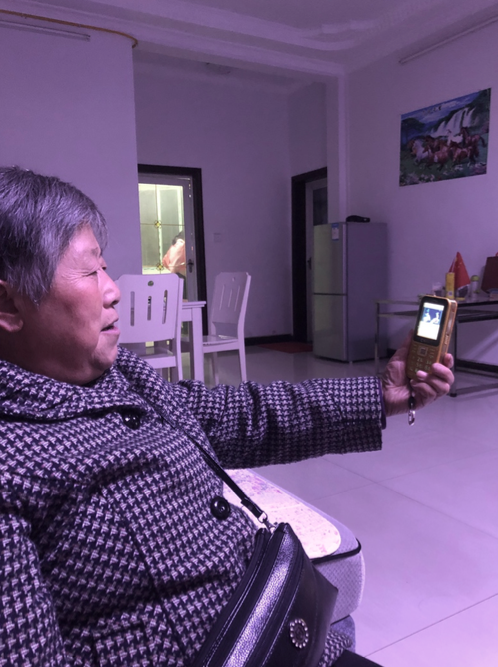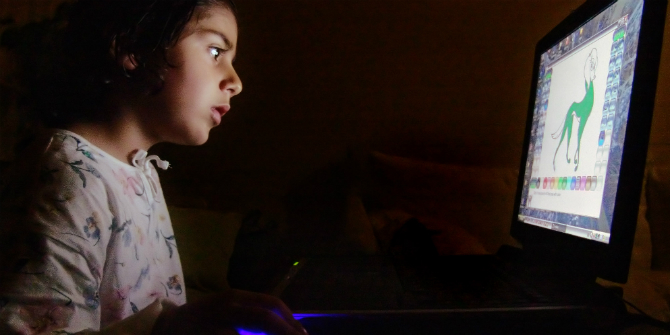 In this post Alice Hao Wu presents findings from her PhD research conducted in rural China into how grandparents and their grandchildren navigate the use of smartphones in the home. Alice details how their differing perspectives towards such technology affects their familly relationships, creating an invisible barrier. [Header image credit: C. Goldberg, CC BY-NC 2.0.jpg]
In this post Alice Hao Wu presents findings from her PhD research conducted in rural China into how grandparents and their grandchildren navigate the use of smartphones in the home. Alice details how their differing perspectives towards such technology affects their familly relationships, creating an invisible barrier. [Header image credit: C. Goldberg, CC BY-NC 2.0.jpg]
According to China’s Child Welfare and Protection Policy Stocktaking 2019, in 2018 there are 6.97 million ‘left-behind’ children (children who stay in rural areas while their parents leave to work in urban areas) in China and 97% of them are taken care of by their grandparents. In recent years, their ‘intense’ and ‘unsupervised’ use of smartphones has become a big concern for academics and the public. Many ‘left-behind’ children have a smartphone or share one with their grandparents. The gadget is now considered essential in terms of communicating with parents who live far away in big cities, as well as for active participation in school [1]. In contrast, grandparents in rural villages rarely own a smartphone, especially the ones aged over 60, or even if they own one, they do not actually use it. Despite its obviousness, the fact that they are excluded by the digital world rarely raises a red flag to the public. Therefore, this blog asks, how are the grandparents marginalised in the digital world, and how does this shape their relationships with their grandchildren?
Taking an ethnographical approach, the author conducted seven months’ fieldwork in two rural villages in Hubei, China in 2019. Eighteen families, based on differential socio-economic status, have been selected as case families. Most of the children in these families are being taken care of by their grandparents.

‘The smartphone is not for us old people’
In the two villages, most of the rural grandparents who are above 60 are not smartphone users, only two out of 17. Their decision to not use a smartphone is profoundly linked to the socially constructed meanings that associate the smartphone with age, and their relational and relatively marginalised positions in the family and the society.
More precisely, a) the smartphones are considered by the elderly (and others) as expensive, easy to break, extremely difficult to learn to use, mainly for entertainment, and not suitable for those who have an elderly physical condition or uneducated people; b) since they often consider themselves ‘useless’ to family as well as society, they try their best to be a contributor not a burden. That means they save money for younger generations in the family instead of purchasing a smartphone of their own. Also, they find ‘playing’ (their word) with the smartphone makes them feel guilty, when they should be helping their family in the ways they still can, such as farming. Similarly, they are afraid to burden others by asking them for help when using a smartphone. c) For many rural elderly, the smartphone is a constant reminder of their low education and poor physical condition (such as their poor eyesight, hearing and memory). Also, asking others for help can be humiliating and demeaning.

All of these factors lead to their active avoidance of a smartphone, which leads to their exclusion from the digital world. This further results in the fact that they feel they are ‘unable’, ‘incapable’ or ‘not the right person’ to take part in their grandchildren’s digital life. The things they believe they can do for their grandchildren is limited to providing them with basic care and necessities.
The consequences are not just for elderly
In contrast, the grandchildren’s use of smartphone is extensive. They do not just do their school homework on a smartphone. According to them, digital games make them ‘excited’ and helps them ‘find friends’; TikTok makes them feel ‘happy’; sometimes messages from strangers are ‘confusing’ and a few ‘adult videos’ make them feel ‘upset and awkward’. They use the phone with their friends but most of the time, they explore this digital world by themselves. They had a strong desire to share when I asked them questions about their adventures on the internet. However, when we were talking about this, their grandparents always sat quietly in the corner, bringing us snacks from time to time.
An 11-year-old girl Xiaomei told me that once she tried to share with a joke she saw on TikTok with her grandfather, but her grandfather said he needed to cook and had no time for this, and he urged Xiaomei to do homework instead. She said to me disappointedly, ‘Then I just played with myself. He cannot understand a thing anyway.’
For these grandparents, they are almost complete bystanders to their grandchildren’s digital world. They feel powerless when it comes to the smartphone – it seems that they’re intimidated by this small gadget that does not belong to their times, despite the fact that the content on the small screen might be familiar. The meaning of being old also forbids them from getting more involved in their grandchildren’s digital world. They feel that they cannot share the happiness that the smartphone brings the kids. They think they should not spend time on the gadget themselves, and they are not able to help, let alone to protect, their grandchildren when they explore alone this brand-new world. It seems that there is an invisible barrier between them and their grandchild, because of this little gadget.
Even worse, the only thing they believe they can and should do is to limit children’s screen time on their smartphone. The belief that the smartphone is mainly used for useless entertainment preoccupies them. As soon as their grandchildren finish homework on the phone, they get worried. Many of them complain to me that controlling their grandchildren’s time on the phone only pushes their grandchildren farther away from them. One the one hand, they feel obliged to do so and on the other hand, it breaks their heart.
Grandmother Tangju had a smartphone once – her son Lee’s old phone. She only used it for taking phone calls. It was her 14-year-old grandson who used it. Once her grandson brought it to school and used it secretly in his dormitory and was found out by his teacher. Lee called his mother Tangju, interrogating her as to why she failed to control the phone. She recalled this in tears. She told me that because she did not know how to control her grandson and she could not bear to control him, she told her grandson the phone was lost. The fact was that she locked it away and changed to an old-fashioned phone which can only take phone calls.
As we can see, the consequences of rural aged grandparents being excluded from the digital world do not just impact the grandparents themselves, but they also have a strong impact on their relationships with their beloved grandchildren.
Notes
[1] Smartphones have become a crucial way for organising school life in China. Almost every class has a class WeChat group or a QQ group. Important matters are announced there and students also upload their homework via these groups.
This post gives the views of the authors and does not represent the position of the LSE Parenting for a Digital Future blog, nor of the London School of Economics and Political Science.





